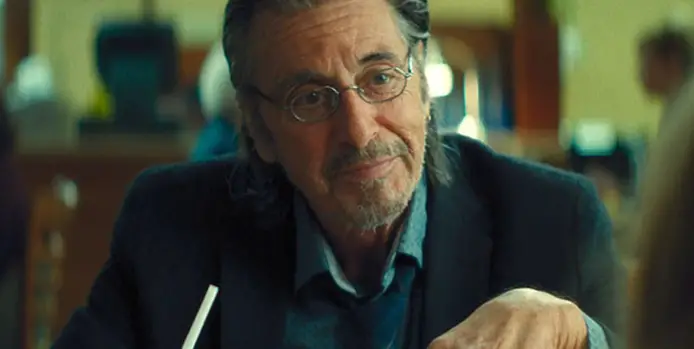MANGLEHORN: More Like Mangleyawn

Adam is from the north-east of England, where he splits…
Here is an interesting thought: Al Pacino is having something of a career renaissance. His last three major roles, including this year’s Manglehorn, are as far away from the go-to gangster’s early movies as can be. In The Humbling, he plays an aging, failing actor in the last throes of his career. In Danny Collins, an aging, failing rock star who wants to turn his life around. And in Manglehorn, an aging eccentric locksmith whose anger at the world keeps him in isolation. Manglehorn is the latest film of Pacino’s to botch what could have been an interesting character study in favour of, well, not much.
Manglehorn is the story of an angry locksmith, Mr. Manglehorn (Pacino), who spends his days in a loop of monotony. He does the same thing every day, punctuated with weekly visits to the bank where he extends his time there by chatting to the lovely Dawn (Holly Hunter). Between freeing children locked in cars and seeing the bank clerk, he spends time with his cat whilst longing for his long lost love.
Lonely, sad, and angry
There’s no nuance, no texture to Manglehorn beyond the one-dimensional element screenwriter Paul Logan gives him. We get it, this guy is old, constantly annoyed at the world and has no friends, but what else? Answer: not much. That might be all that sustains the character, but it’s nowhere near enough to sustain a 97-minute film. Logan’s inexperience shows – his only other writing credit is a short film, and it feels like this should be cut down to a short too.

There’s one striking moment in the first half hour or so of Manglehorn. A melancholy voice over (which are used far too often to be effective) is interrupted by him shooting a glass bottle off a wall. It works because up until this point, we’ve only been shown Pacino meandering sadly around his sad little town doing his business sadly. When this moment happens, the sound of a glass shattering interrupts the quiet life we’ve grown accustomed to. Maybe something will happen now! Maybe Manglehorn is on the verge of breaking! He’s not. He goes back to his dull life, dispelling any interest that might have been peaked by firing a gun.
Story? What’s a story?
The script of Manglehorn also feels contrived, working too hard all the time to hammer into the viewer that this is not a very nice man. Obviously his adorable granddaughter still sees magic in the world, because she’s about 6. Obviously Dawn, the happy-go-lucky bank clerk, has a different outlook on life. Putting them in a scene with Manglehorn purely serves to show how isolated and out of step he is.
The chance for an in-depth character study is stumbled over because the film is so in love with its own sadness. This works when Pacino is alone – his immense acting gifts let him raise the hammy directing and script into something else, something like a moving meditation on fading out of society in old age. We see a vulnerable side to Pacino that’s still quite jarring – his name will always be synonymous with gangsters, cocaine, and machine guns. When he’s alone on the screen in a dimly lit room trying to get his cat to eat, his vulnerability both as a character and an actor are on full show.

David Gordon Green’s directing is, unusually, totally unfocused. His 2013 film Joe does what Manglehorn attempts – taking a well-known actor, in that case Nicholas Cage, and putting him in a setting we wouldn’t expect to see him in. Where Joe was a heartfelt and intelligent story of difficult life in America’s south, Manglehorn fails to recapture what made that film work, despite having a similar small-town southern America setting.
You’re better than this, Al
It’s like Green and Logan were so in awe of actually getting Pacino to be in the movie that they forgot about everyone else. That ‘everyone else’ is pretty impressive too – Holly Hunter, Chris Messina, and Harmony Korine all pop up at some point. They’re given next to nothing to do other than show, once more, that Manglehorn hates everything. And because Manglehorn himself is a crudely drawn character with no hidden (or obvious) depths, he’s not interesting enough to sustain the character study that the film wants to be.
When it’s not trying to reach for character study, we get a half-hearted attempt at a love story. It fails here too because so much attention is given to the main character, and it leaves no room for the supporting ones to grow. So the love story pushed on us isn’t rewarding or interesting at all because it’s between a one dimensional character we’re already tired of seeing and someone who barely deserves to be called a character. We don’t care enough about either of them to be invested in what could potentially blossom between them.
Manglehorn pretty much fails at what it’s trying to do. Even Pacino’s acting can’t really redeem it from being a one-dimensional misfire. That isn’t really a reason to purposefully seek it out either – we don’t need a reminder that he can act, do we? At least he’s still making interesting choices, I suppose, but Manglehorn isn’t at all worthy of him.
How do you think Manglehorn holds up against the rest of Pacino’s late work?
(top image source: IFC Films)
Does content like this matter to you?
Become a Member and support film journalism. Unlock access to all of Film Inquiry`s great articles. Join a community of like-minded readers who are passionate about cinema - get access to our private members Network, give back to independent filmmakers, and more.
Adam is from the north-east of England, where he splits his time unequally between films, TV, and books.













